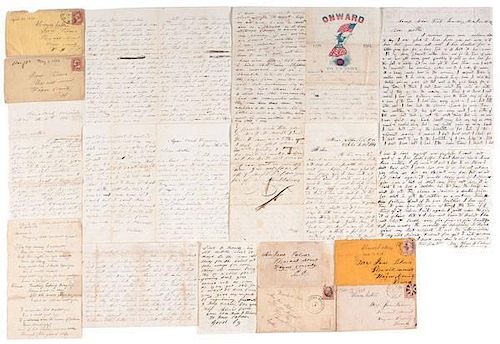Abner B. Palmer, 56th Pennsylvania Volunteers, Civil War Archive
About Seller
6270 Este Ave.
Cincinnati , OH 45232
United States
With offices in Cincinnati, Cleveland and Denver, Cowan’s holds over 40 auctions each year, with annual sales exceeding $16M. We reach buyers around the globe, and take pride in our reputation for integrity, customer service and great results. A full-service house, Cowan’s Auctions specializes in Am...Read more
Two ways to bid:
- Leave a max absentee bid and the platform will bid on your behalf up to your maximum bid during the live auction.
- Bid live during the auction and your bids will be submitted real-time to the auctioneer.
Bid Increments
| Price | Bid Increment |
|---|---|
| $0 | $25 |
| $500 | $50 |
| $1,000 | $100 |
| $2,000 | $250 |
| $5,000 | $500 |
| $10,000 | $1,000 |
| $20,000 | $2,500 |
| $50,000 | $5,000 |
| $100,000 | $10,000 |
About Auction
Jun 13, 2014 - Jun 14, 2014
Cowan's Auctions dawnie@cowans.com
- Lot Description
18 letters, many with covers.
In the winter of 1861, Abner B. Palmer, of Pleasant Mount, PA, enlisted in Company “A”, 56th Pennsylvania Infantry for three years, and reenlisted in 1864 when the 56th was made a veteran unit. The 56th saw action at most of the major battles in the Eastern Theater, and was the first Union infantry to open fire at Gettysburg.
This archive consists of eleven war-date letters by Palmer, four letters from family, and three from Private George Smithing of the 2nd Pennsylvania Heavy Artillery.
The first letter of note is titled Answer to “Praying That We Meet Again”, and is a transcript of a love song from a soldier to his love, asking that she wait for him. Palmer’s first camp letter was from Camp Curtin, PA, where the 56th was forming. Dated January 8, 1862, on patriotic color letterhead Onward To Victory 1776 – 1861, the letter explains why he hadn’t been home to visit - he had been exposed to smallpox five times at camp, after catching the measles from an epidemic that had swept through the ranks of the regiments forming there.
The spring of 1862 found the 56th doing guard duty along the Potomac. Palmer’s next two letters were written as Company “A” moved from Liverpool Point, MD, across the Potomac to Aquia Creek, where they were repairing the landing and railroad tracks. On June 4, he wrote from Fredericksburg, VA:
The folks that is left here looks as if they could eat a man up, but they can’t scare us. Our guards have been shot at by some of them and stones chucked, but they did not get hurt any. The folks that are left here would starve if it weren’t for our army. This part shows the effect of the war bad, but not half as bad as it ought to. Fredericksburg will be burnt yet if the people don’t behave themselves different than they have since our troops have been there.
On September 11, 1862, Palmer wrote from Camp in Maryland Some where, describing the almost non-stop marching since leaving Fredericksburg. He wrote:
I have seen hard times. I have been in three battles & three skirmishes since we left Fredericksburg. Besides, I have marched nearly three hundred miles. I can’t say that I am well, but I am thankful that I am alive & without a wound, while many of my comrades are left on the battlefield of Thoroughfare Gap & Bull Run.
The next letter was from Pratt’s Landing, VA, dated January 18, 1863 [misdated 1862]. Abner noted that the regiment was under marching orders, and I expect another move to be made on Fredericksburg soon. He wrote that he had tried to stay out of the hospital, but his limbs were swollen and he had suffered from chronic diarrhea for two whole months!
On May 28, near White Oak Church, Palmer mentioned to his brother that they had been on the front lines ever since Fredericksburg, except for Chancellorsville, where they lost 11 wounded and 2 dead while conducting a diversionary attack.
The letters resumed on January 15, 1864, which found Palmer at Culpepper, VA. The 56th was about to be reorganized into a veteran unit, and many of the boys were headed home on furlough. Palmer, who was Sergeant of Company “A” at this time, couldn’t reenlist until his term was up, and was afraid he would be transferred out of the regiment. A war-weary Abner confided:
I can’t see where this war is any nearer over than it was 2 years ago… I never want to hear the sound of a cannon or gun again, but I will have to see more perhaps next summer than last… I don’t know what has protected me this far. I never had a shot through my clothes til the Battle of Gettysburg. There I had a narrow case of losing my leg.
October 12 found Abner Near Weldon RR, at Petersburg, where he said the guns fired at every hour, day and night. He told his mother that he had been so busy that summer that he had had no time to write. His mention of caring for his horse in this letter prompted more research, to discover he had been promoted to 2nd Lieutenant of Company “A” on July 13, 1864. (A copy of the state record is included in this lot.)
Palmer’s letter of January 17, 1865, found the 56th Pennsylvania still at the Weldon RR. He mentioned how busy he had been since coming back from Warren’s raid of Decemer 7-11, and that he wouldn’t be coming home on winter furlough: When I go home again, I would like to have the privilege of staying there. I hope one more campaign will end this war. Many think it will be ended by the end of May.
The last letter is dated June 8, 1865, Arlington Heights [VA]. There were thousands of men waiting to be mustered out, but the war wasn’t over for some. Palmer wrote that the 15th and 25th Corps had been sent to Texas, the 25th being black troops. Three post-war family letters are included in the lot, dated 1867, 1869, and 1882.
There are also three unrelated war-date camp letters from Private George Smithing of Battery “M”, 2nd Pennsylvania Heavy Artillery, written from the fortresses around Washington, DC. Dated between February and April 1864, these letters were written before Battery “M” was sent to the front. One letter, dated March 30, 1864, from Finley Hospital, is on brilliant color patriotic letterhead with the Connecticut arms, probably borrowed from another patient. Records show that Smithing previously served with the 132nd Pennsylvania Infantry (9 months), which is honored with a monument on the Antietam battlefield. - Shipping Info
-
SHIPPING. At the request of the buyer, Cowan's will authorize the shipment of purchased items. Shipments usually occur within two weeks after payment has been received. Shipment is generally made via UPS Ground service. Unless buyer gives special instructions, the shipping method shall be at the sole discretion of Cowan's Auctions, Inc.. Cowan's is in no way responsible for the acts or omissions of independent handlers, packers or shippers of purchased items or for any loss, damage or delay from the packing or shipping of any property.
-
- Buyer's Premium



 EUR
EUR CAD
CAD AUD
AUD GBP
GBP MXN
MXN HKD
HKD CNY
CNY MYR
MYR SEK
SEK SGD
SGD CHF
CHF THB
THB




